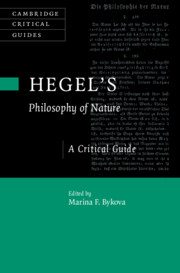Book contents
- Hegel’s Philosophy of Nature
- Cambridge Critical Guides
- Hegel’s Philosophy of Nature
- Copyright page
- Dedication
- Contents
- Contributors
- Acknowledgments
- Abbreviations
- Hegel’s Philosophy of Nature
- Part I Hegel’s Philosophy of Nature in the Historical and Systematic Context
- Chapter 1 The Feebleness of the Concept in Nature
- Chapter 2 Nature and Its Limits
- Chapter 3 Naturphilosophie and the Problem of Clean Hands
- Chapter 4 On Hegel’s Account of Nature and Its Philosophical Investigation
- Chapter 5 The Logic of Nature
- Part II Cosmology, Mechanics, and Physics
- Part III Organics
- Part IV On Contemporary Challenges for the Philosophy of Nature
- Bibliography
- Index
- Cambridge Critical Guides
Chapter 5 - The Logic of Nature
Nature as the “Idea in the Form of Otherness”
from Part I - Hegel’s Philosophy of Nature in the Historical and Systematic Context
Published online by Cambridge University Press: 19 December 2024
- Hegel’s Philosophy of Nature
- Cambridge Critical Guides
- Hegel’s Philosophy of Nature
- Copyright page
- Dedication
- Contents
- Contributors
- Acknowledgments
- Abbreviations
- Hegel’s Philosophy of Nature
- Part I Hegel’s Philosophy of Nature in the Historical and Systematic Context
- Chapter 1 The Feebleness of the Concept in Nature
- Chapter 2 Nature and Its Limits
- Chapter 3 Naturphilosophie and the Problem of Clean Hands
- Chapter 4 On Hegel’s Account of Nature and Its Philosophical Investigation
- Chapter 5 The Logic of Nature
- Part II Cosmology, Mechanics, and Physics
- Part III Organics
- Part IV On Contemporary Challenges for the Philosophy of Nature
- Bibliography
- Index
- Cambridge Critical Guides
Summary
This chapter examines the issue of the “logic” underlying Hegel’s exposition of the “concept of nature.” Given the systematic structure of Hegel’s Philosophy of Nature, which is positioned between the Logic and the Philosophy of Spirit, the problem of the logic guiding the immanent development of nature’s forms as well as the development of the philosophical cognition of them is, in Hegel’s view, a particularly relevant one. At the center of this chapter is the question of whether the “logic of nature” is the same logic presented in the first systematic division of Hegel’s philosophy or rather a modified variant of such a logic. The logic of nature, it argues, combines the determinations of pure speculative thinking (or the determinations of the “absolute idea”) with the specific conditions offered by the concept and by the reality of nature. Crucial to this logic is, first, Hegel’s famous definition of nature as the “idea in the form of otherness.” Such a definition obtains from the end of the Logic, which is be examined in detail, and followed through some crucial passages from the Philosophy of Nature. This chapter follows the development of the logic of nature between two extremes – the “absolute idea” and “spirit” – and concludes with a brief examination of the three syllogisms with which Hegel crowns his encyclopedic system.
- Type
- Chapter
- Information
- Hegel's Philosophy of NatureA Critical Guide, pp. 97 - 116Publisher: Cambridge University PressPrint publication year: 2024

